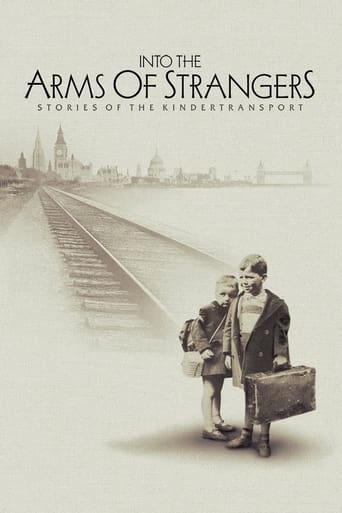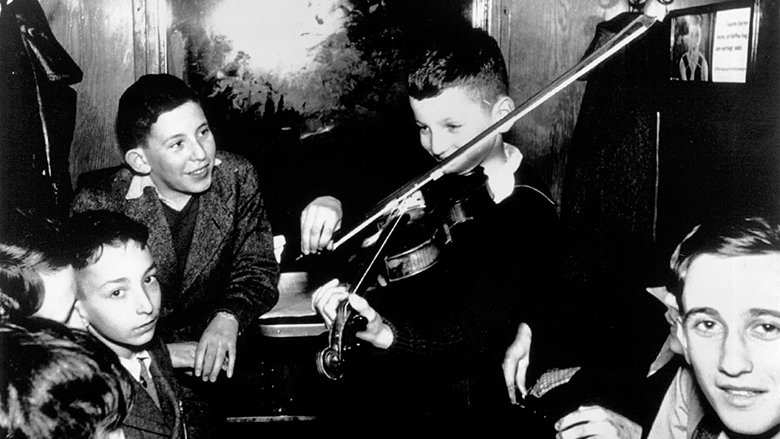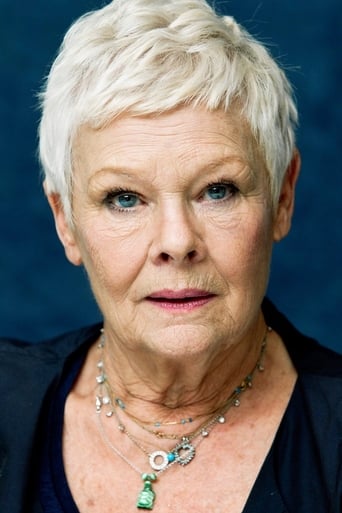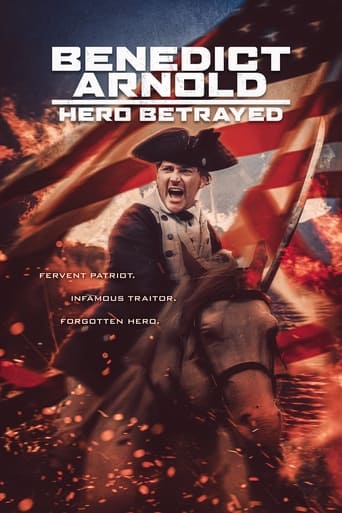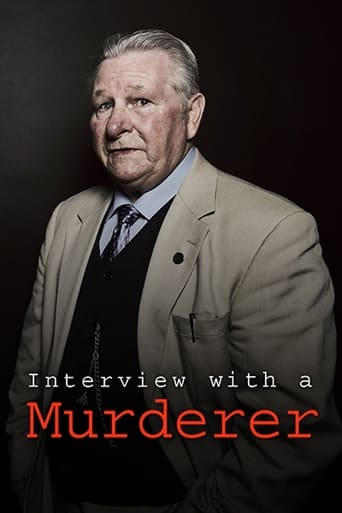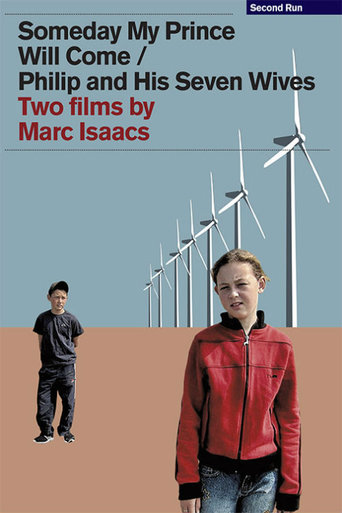Into the Arms of Strangers: Stories of the Kindertransport (2000)
In the nine months prior to World War II, 10.000 innocent children left behind their families, their homes, their childhood, and took the journey... to Britain to escape the Nazi Holocaust.
Watch Trailer
Cast


Similar titles
Reviews
"Into the Arms of Strangers", directed by Mark Jonathan Harris, is a loving account of what parents resort to do in order to save their children from a tragedy that was looming over Europe. Having missed this film when it was first released, we caught up with it in the DVD format that has been lovingly transferred to that medium.The story of the "Kindertransport" is recounted by some of the children that participated in it. We watch them as they are today, and through pictures, and sometimes on those old newsreels and films where they are captured as children in Germany, and the countries where the prosecution of Jews took an ugly turn.Our heart goes to some of these older people that speak with such dignity in spite of what was done to them and their families. It's a tribute to the people who tell us what happened to them in the way they express their experiences without venom, or malice. After all, these persons showcased in the documentary are all survivors, something that thousands other Jewish children didn't have the same fate.One can only imagine what these individuals went through at such an early life, many without being able to speak English, or made themselves understood in the households that received them. Imagine a child separated from loving parents having to deal with a world gone mad. It speaks volumes the people that tells us their stories turned out to be the way they did!Dame Judy Dench's narration works well in the context of the material being shown. Mark Jonathan Harris has made a valuable contribution to show the whole world how a mad man changed these children's lives, and their parents' forever.
This film clearly demonstrates how ashamed this country should be in regard to some of it's actions during WW2, and how evil the people in power in government could be. In some ways, no better than the Nazi's. We had the clear chance to save 10's of thousands of children's lives, yet we denied safety to the most innocent of victims of Hitler. And all because of a 'moral majority' that said it wasn't right to separate children from their parents. The same 'moral majority' that controls this country today. In fact, I believe if someone asked us to save the lives of children in places like Afghanistan and Iraq, we would probably again refuse. The real reason being because these are people with different religious beliefs. And these people have the audacity to call themselves 'Christians'. These are the same type of 'Christians' as those who formed the Spanish Inquisition. Who have founded their religion on hatred of anyone different or simply anyone who has a different idea than they do. It's truly ironic that Washington has a Holocaust museum when it's clear that the government (who knew exactly what Hitler was doing to the Jews long before the common people did) supported Hitler's genocide by it's silence on the matter, just as the Catholic church did. But in the case of the Catholic church it was no surprise, because it has always been a representative of hatred toward all Jews, Muslims, and anyone who isn't 'Christian'. And by the way, I'm not Jewish, I'm not anything, just someone who hates intolerance and cruelty of any kind.
I caught this movie on a local PBS station one night as I was flipping through channels while waiting for some friends. I had to watch the rest after seeing only a little. This is a good documentary--nothing too flashy or innovative in the making--but stunning because of the material.Maybe it struck a chord with me because of resonances and trauma in my own childhood--but I think it's more than that. Look at children's books (and books about children) and a lot addresses themes of orphanage, abandonment, loss of parents and related issues (from Roald Dahl or Charles Dickens, for example). This documentary strikes these themes head on with real stories. It's hard not to be moved by the vulnerability of children in such dire circumstances.The stories are both heart breaking and heart warming and will make you wonder how such cruelty and evil could exist to create these events in the life of a child. On the other hand, many ordinary people rose to the occasion and did something heroic to help these vulnerable, often orphaned children of World War II.This is a wonderful and painful film to watch because of the stories of the now grown children. I'll mention a few examples (**spoilers**), so if it's going to bother you to have a bit of a preview, don't read on.One boy, after being placed with a family in England for 6 or 7 years during WWII, finally got the miracle of meeting his parents again after they had somehow come through the war. He no longer spoke the same language (English, not German), felt uncomfortable and awkward even meeting them again because they no longer seemed like the same people. It was a wonderful and painful reunion.Most kindertransport children were not so lucky, waited years for their parents to find them after the war, and then discovered that the reunion would never take place. Still waiting with an empty spot in their hearts.Some evacuee children tried bringing their parents to England before emigration from Germany was shut down by the Nazis. One girl tells of looking for the large, wealthy homes, going door to door, and begging the occupants to give her parents a job so that they would be granted visas by the British government.Some of these children (who initially spoke little English) were treated well, adopted and loved in new families. Many were taken care of but were moved from one foster home to another, and some had horrible experiences such as being sent to families who wanted to use them as servants (uniforms and all) rather than treating them with respect or care.I've seen a lot of different films and documentaries about Nazi Germany over the years, but I'm not particularly moved by many of them since they don't always personalize the experience. Many of these types of films just leave me numb afterward and though I appreciate and understand the horror, these films often leave me relatively unmoved and mostly just horrified.I'd recommend watching this documentary even if you don't like the typical Nazi Germany documentary. This isn't only about a historical event, but about vulnerability, evil, heroism, desperation, grief and a kind of redemption. The themes are reflected in the personal stories of children brought to a foreign land without their parents. I doubt most people could come away from this movie feeling unmoved or unchanged by the experience in some way. In other words, see this documentary. You won't regret it.
The Testament of holocaust survivors is always worth hearing, lest we forget the depths to which humanity proved it was capable of sinking. In fact, the scale of the tragedy is almost incomprehensible to a privileged modern mind, hence the appeal of stories like 'Schindler's List', which focus on a few who were luckier than most: they give us an insight into the horror, without totally disconnecting from our own, more fortunate, experience. 'Into the Arms of Strangers' likewise tells a more human story than the bleakest truths, namely that of Jewish children taken in by Britain before the war. It's not a bad film, and yet to me it was not the most powerful account of the holocaust I've seen in spite of its human scale. Perhaps this is because the worst fate suffered by the rescued - the death of the families they left behind - was a burden gradually assumed, not directly witnessed, and the survivor's stories are thus that little bit more polished and analytical than in the most compelling documentary - whereas perceptions of events are static (and thus retain their quality of immediacy), our interpretations of our feelings are influenced by what happens afterwards, and even our own stories become slightly second-hand over time. Or perhaps this impression is merely created by the film-makers' slightly heavy-handed use of background music and images. In spite of the above, this is still a highly poignant and important film. We who live today should count, and guard, our blessings.

